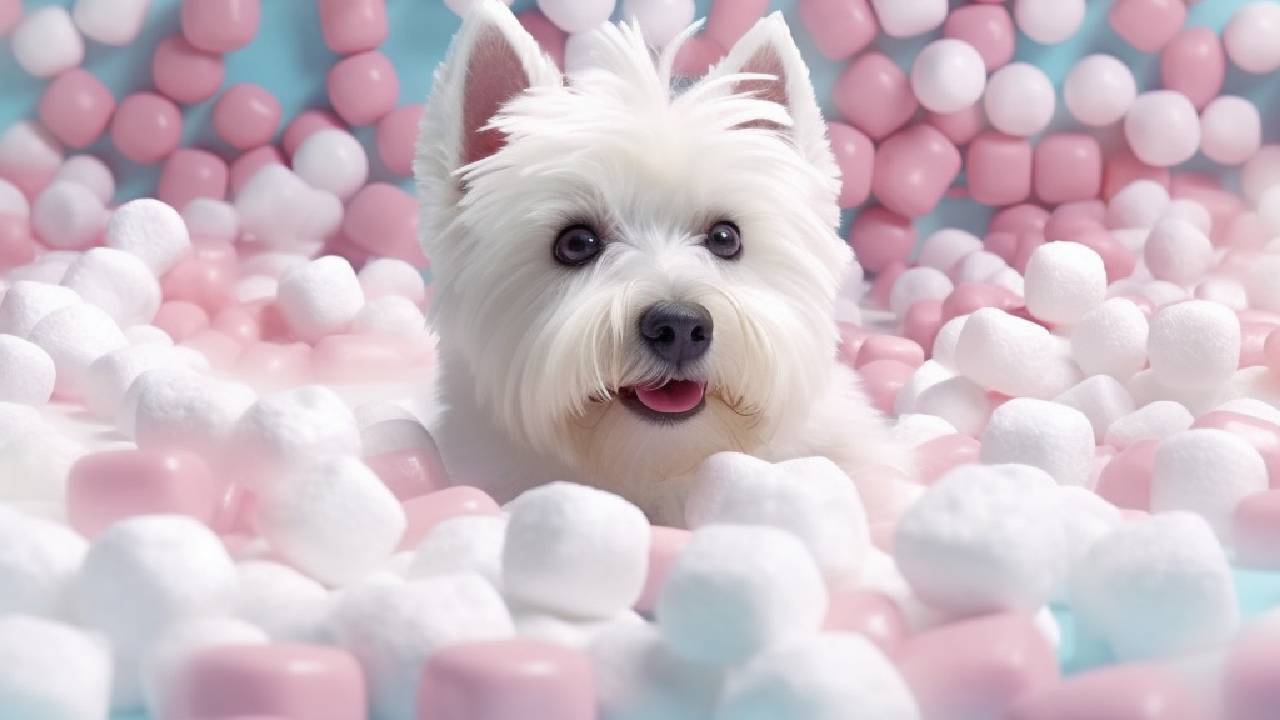Picture this: You’re cozied up on the couch with a bag of fluffy marshmallows in hand, enjoying their sugary sweetness. With those irresistible puppy eyes, your loyal puppy gives you that “I want some too” look.
You might be tempted to toss a marshmallow their way, but hold on a second! Can dogs eat marshmallows safely? This article will explore whether marshmallows are a treat fit for your four-legged friend, their potential dangers, and what to do if your dog paws on some of these sweet, squishy confections.
Marshmallows for Dogs
Ah, marshmallows – those soft, sugary clouds that melt in your mouth. While humans can indulge in marshmallows without worry, the same cannot be said for our furry companions. The short answer is that feeding marshmallows to dogs is generally not recommended. Here’s why:
Sugar Sensitivity
Like adult dogs, puppies enjoy sweet tastes, but their growing bodies are more sugar-sensitive. Excessive sugar consumption can lead to obesity and dental problems in puppies, just as in adult dogs. Therefore, marshmallows should be an occasional and limited indulgence for puppies.
Choking Hazard
Marshmallows, though soft, can pose a choking hazard for puppies because of their small size and squishy texture. To make them safer for your little one, always cut marshmallows into tiny, puppy-sized pieces or consider using specially designed treats instead.
Nutritional Concerns
Marshmallows offer little nutritional value and can displace healthier foods from your puppy’s diet. Puppies require a balanced diet to support their growth, so it’s important not to make marshmallows a regular part of their meals.

Xylitol in Marshmallows: The Silent Killer
Let’s delve deeper into the xylitol issue because it’s a critical concern for dog owners. Xylitol is a sugar alcohol commonly used as a sugar substitute in various products, including sugar-free gum, candies, and, yes, even some brands of marshmallows. While xylitol is safe for human consumption, it’s highly toxic to dogs.
When a dog ingests xylitol, their body mistakes it for natural sugar. This triggers insulin release, causing a rapid drop in blood sugar levels. This condition, known as hypoglycemia, can lead to symptoms such as vomiting, loss of coordination, seizures, and, in severe cases, coma and death.
Xylitol can be found unexpectedly, so checking ingredient labels on human foods you might consider sharing with your dog is essential. Always be cautious and avoid giving your dog any food containing xylitol.
What to Do If a Dog Eats Marshmallows
Now, picture this: In an impulsive moment of curiosity, your puppy manages to sneak a bite of a marshmallow. Panic courses through your veins. What should you do? Follow these steps:
- Identify Xylitol: Begin by checking whether the marshmallow contained xylitol. If it did, don’t waste a second; contact your veterinarian immediately, even if your puppy seems unaffected. Early intervention is crucial in xylitol poisoning cases.
- Observe for Symptoms: If the marshmallow was xylitol-free, closely monitor your puppy for unusual behavior or symptoms. Watch for signs like vomiting, diarrhea, or excessive lethargy. If any concerning symptoms arise, contact your vet promptly.
- Hydration: Encourage your puppy to drink water to help dilute any sugar or potential toxins in their system.
- Don’t Induce Vomiting: Avoid attempting to induce vomiting at home without professional guidance. It can be risky and harmful if done incorrectly.
- Seek Professional Help: When in doubt or if your puppy exhibits any worrying signs, contact your vet or an emergency animal clinic for expert advice tailored to your puppy’s specific situation.
Dog-Friendly Alternatives
If you’re looking to treat your pup to something special, there are plenty of safe and healthy options available:
- Dog Treats: Many dog treats are designed to be tasty and nutritious. Look for those with natural ingredients and appropriate portion sizes for your dog’s size and age.
- Fruits and Vegetables: Many dogs enjoy fruits and vegetables like apples, carrots, and blueberries. These make for a tasty and healthy treat.
- Homemade Treats: Consider making your dog treats at home using dog-friendly recipes. This way, you can control the ingredients and ensure they’re safe for your furry friend.
- Special Dog Chews: Chew toys designed for dogs can provide hours of entertainment and help keep their teeth clean.

Conclusion
Marshmallows, loved by humans, aren’t ideal for dogs due to potential xylitol content. This sweetener is harmful, even in small amounts. For your dog’s health, avoiding giving them these treats is crucial. Instead, provide them with dog-friendly alternatives.
If your dog does consume marshmallows or any xylitol-laden products, seek veterinarian assistance immediately. Prioritizing their well-being ensures their continued happiness and affection towards you. Safety is paramount; always choose treats suitable for your pet’s health.
FAQs
Are marshmallows toxic to dogs?
No, marshmallows are not inherently toxic to dogs. However, they often contain ingredients unsuitable for canine consumption, such as sugar.
What ingredient in marshmallows is particularly harmful to dogs?
Some marshmallows contain xylitol, a sugar substitute, which is highly toxic to dogs. Always check the ingredients before giving any to your puppy or dog.
Can I give my dog a small amount of marshmallow?
While a tiny piece might not harm your dog occasionally, it’s best to avoid it because of the sugar and potentially unknown ingredients.
Are there any benefits to feeding marshmallows to my dog?
Marshmallows offer no nutritional benefits for dogs and are purely a sugary treat.
How should I react if my dog accidentally consumes a marshmallow?
If it’s a small amount, monitor your dog for any signs of distress. If you suspect the marshmallow contained xylitol or if your dog eats a large number, contact your vet immediately.
Are there any dog-friendly alternatives to marshmallows?
Yes, various dog treats are shaped or flavored like marshmallows but made with dog-friendly ingredients. Always choose treats designed specifically for dogs.
Why do some dog owners give marshmallows as treats?
Dog owners might need to know the potential risks or believe a small amount won’t hurt. However, it’s always best to prioritize treats made specifically for dogs.






Wow, had no idea marshmallows could be harmful. I admit I’ve given a few nibbles to my dog, Max, in the past. Won’t be doing that anymore! You guys are a lifesaver with these articles. Keep ’em coming!
I occasionally share a marshmallow with my dog, Charlie… 🍬